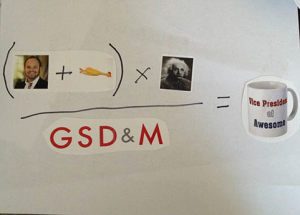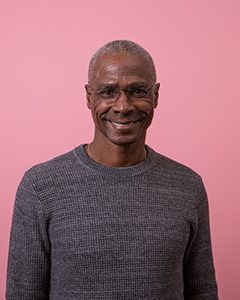Editor’s Note: As part of our new blog feature “Get to Know..,” we will give our readers a look inside GSD&M as we interview various employees about their role and bizarre-o talents and hobbies.
For this edition, you’ll hear from Jonathan Hart, VP/Decision Sciences:
So what exactly does decision sciences mean?
Decision Sciences is a collaborative approach involving mathematical models, business tactics, technological applications and behavioral sciences to make data-driven decisions. There will be a quiz later.
Give us a look inside your typical day.
Occasionally I drink half a bottle of scotch at lunch and then spend the afternoon calling people into my corner office so I can criticize their poor typeface choices and unprofessional dress (We are trying to run FORTUNE 500 companies here, not lemonade stands!). (Editor’s note: He’s kidding.)
World of Warcraft username?
I’ve never played WoW, but I have been a Final Fantasy fan since I was very young. I recently became the 15th person in the world to collect every achievement in their MMORPG…after playing it for over 10 years. This is probably the most awesomely embarrassing thing I could admit about myself.
You led a GSD&M Ideas That Make A Difference presentation that hinted you believe we may all simply be participants in a video game simulation, which is pretty crazy to think about, tell us more.
This is actually a very old idea. Plato, Descartes, the Dalai Lama and other philosophers have speculated on it for centuries, but only recently have we begun to understand how technology might actually make this possible to construct or detect. To anyone paying attention, it’s quite obvious that there is more going on in our world than can be directly observed. Spectrums of light we can’t see, sounds we can’t hear and phenomena we can’t explain. If you have spent time in nature, had a religious experience, experimented with drugs or really made an effort to contemplate on our size in the cosmic scale, you know this to be true. When did you know you wanted to focus on analytics?
When did you know you wanted to focus on analytics?
I was initially drawn to the field of economics as an undergraduate for its use of analytical tools to solve problems that are otherwise of an overwhelming scale and complexity. I was fascinated by how these techniques could transcend scientific theory and be directly applied to solve industrial challenges. I find the leverage that computational power gives us captivating—the ability to scour inconceivable volumes of data to generate counterintuitive insights that have been overlooked by even the most skilled practitioners.
Big data is all the rage, but how can brands better use small data?
It’s very hard to change the way we make decisions. Much of our personal value and self-worth is tied to having expert knowledge. More often than not, data of any size is used to help prove something we already believe, not to learn whether or not that belief is valid. I was floored the first time I heard the term “evidence-based medicine.” What have we been basing our medical decisions on up until now?
What do you do for fun?
I collect books. I own almost every book I’ve ever read in hardcover. #destroykindle
The UT Longhorns and Georgia Bulldogs are going head-to-head in the National Championship, who do you cheer for?
Is this a question? SEC, SEC, SEC.
You’ve lived in international cities like London and New Delhi, how does that compare to your experience working in Austin?
We seem so different, but we are really not; people are mostly the same everywhere. They care and worry about the same things. Finding a sense of self-worth, trying to understand “why,” belonging to a community, providing for their family and improving the opportunities available to their children.
Proudest moment at GSD&M thus far?
It has to be the Decision Sciences team winning the annual Christmas Card Contest. It was awesome to see them so fearlessly embrace their nerdiness and bring such passion to showing others what they are capable of.
What characteristics do you look for people when hiring talent?
I like people who come at problems sidewise. Something like 80% of innovation supposedly comes from cross-pollination between industries. I almost never hire anyone with an advertising background. You can teach people an industry, but it’s much harder to teach them to think. I find the people who tend to be most successful are the people who could do two or more jobs, because it helps them to think holistically and attack a problem from multiple angles.
Sum up GSD&M’s culture in one word? heteroscedastic




